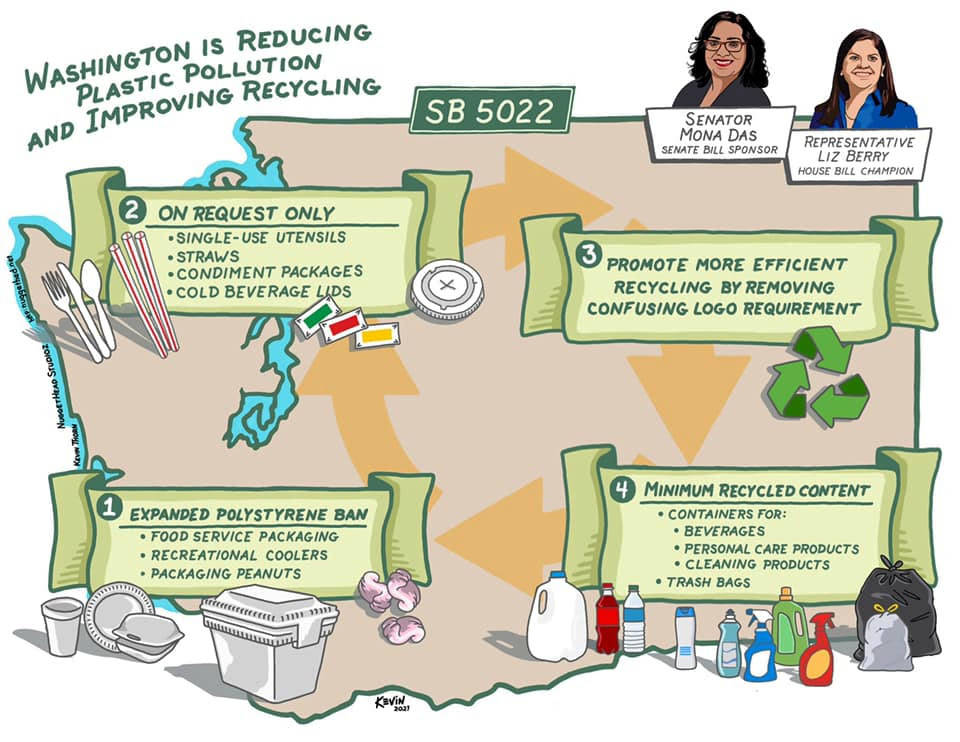The use of plastics will soon change in Washington state due to a new law.
Sponsored by Sen. Mona Das, D-Kent, it is the first law in the nation to ban expanded polystyrene food ware, recreational coolers and packing peanuts, according to a state Senate Democrats May 17 news release. It will also require increased recycled content in plastic beverage containers, trash bags and bottles for household products and require that utensils, straws, cup lids and condiments only be provided to customers on request.
Gov. Jay Inslee signed Senate Bill 5022 into law Monday, May 17 at the Seattle Aquarium, one of only a few bills being signed at in-person events this year.
SB 5022 is a leading-edge policy in a series of actions that the Washington state Legislature has taken to move toward climate change and pollution mitigation, according to the news release. The legislation builds on a bill Das championed in 2020 that banned thin plastic carry-out bags and required that thicker plastic bags consist of 40% post-consumer recycled content.
“The Washington Legislature has taken groundbreaking steps in recent years to address the problem of plastic, and continuing that progress is vital to the health of our communities and our planet,” Das said. “I am so proud that we’ve passed yet another tool to move us toward a cleaner, greener Washington – and I have been honored to work with my colleagues in the House and Senate, industry leaders, advocates, and community members to get this done.”
Awareness and concern about the 33 billion pounds of plastic waste that enters the earth’s oceans each year are growing. Addressing plastic and, especially, expanded polystyrene is increasingly popular with the public. A recent Public Policy Polling survey of bipartisan participants in Colorado, Florida, Maine and Washington state found that upwards of 76% would like to see more legislation to reduce plastic and water pollution. A majority (57%) of people surveyed say they support a statewide ban on foam takeout containers.
“Washington has been a national leader on addressing recycling and plastic pollution,” said Rep. Liz Berry (D-Seattle), the sponsor of the House companion bill to SB 5022. “I hear from my constituents, and even my 5-year-old son – who told me that garbage is the biggest threat to our oceans – that we must take urgent action.”
SB 5022 will require beverage manufacturers to meet progressively greater levels of post-consumer recycled content in their plastic containers, which will help drive the market for recycled plastic resin. The bill also makes Washington the first state to require minimum recycled content for plastic bottles used for household cleaning and personal care products. It earned the support of major beverage companies impacted by the policy.
In regard to expanded polystyrene, the sale or distribution of packing peanuts will be prohibited beginning June 2023. Most portable coolers, food service ware and containers will be prohibited beginning June 2024. This expanded polystyrene prohibition is very similar to SB 6213, legislation sponsored by Das that passed the Senate in 2020. The bill will also require that food service businesses provide plastic utensils, straws, condiment packaging and cup lids only upon request, beginning in 2022, with some exceptions made for hot beverage lids, drive-thrus and delivery services. This makes Washington the first state to require comprehensive opt-in for plastic utensils, straws, cup lids and condiments.
“I was proud to introduce this bill to tackle the plastics crisis,” Das said. “At this point – in 2021, in a state that has consistently been at the cutting edge of new technology and sustainable development – we should not be manufacturing material that isn’t recyclable, reusable or compostable.”
Talk to us
Please share your story tips by emailing editor@kentreporter.com.
To share your opinion for publication, submit a letter through our website https://www.kentreporter.com/submit-letter/. Include your name, address and daytime phone number. (We’ll only publish your name and hometown.) Please keep letters to 300 words or less.

